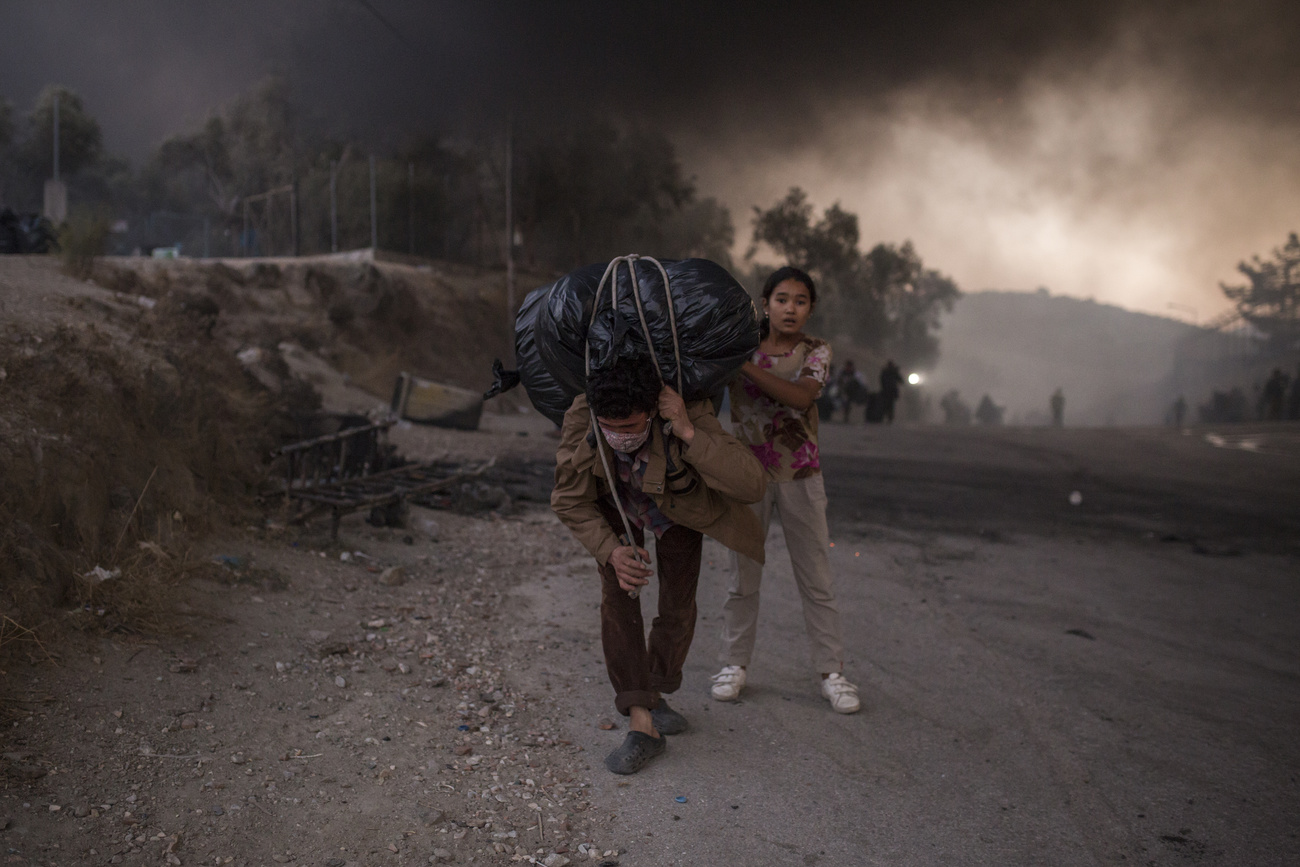
Swiss NGOs and cities demand Lesbos camp victim action

Thousands of migrants were left without shelter after fires gutted their overcrowded camp on the Greek island of Lesbos. This has prompted calls for emergency support and to relocate the victims – including in Switzerland.
The true extent of the devastating fires that gutted the Moria refugee camp on Tuesday night was only visible the following morning. The camp has been reduced to a mass of smouldering steel and melted tent tarpaulins, and the 12,500 residents are now mostly homeless.
“Around 80% of the camp has burned down,” said Nicolas Perrenoud, who works for the Swiss NGO One Happy Family OHFExternal link and lives on the island.

But the aid worker said he was not surprised.
“This disaster has been in the air for a while,” he told swissinfo.ch. Tensions had been rising at the site in recent months. The overcrowded camp had been in lockdown due to the Covid-19 pandemic since March and measures had been steadily tightened.
“Since the first coronavirus cases last week the camp has been practically sealed off. Even basic services were stopped, and only medical emergencies were dealt with,” said Perrenoud.
‘Started by asylum seekers’
But since no proper quarantine zones were set up, fear and uncertainty spread throughout the camp, he said. This led to anger, a number of strikes and demonstrations over the past few days. The fires on Tuesday night were the culmination of what has been a gradual escalation. Blazes were started in the camp, strong winds fuelled the spread of the fire, and firefighters could do little to prevent it.
On Wednesday morning, the Greek government declared the island a state of emergency and sent additional units of riot police from Athens. There were reports of thousands of migrants stranded without shelter on the island, and the government said it would take days to find housing for all of them.
Government spokesman Stelios Petsas told reporters on Thursday that the inferno was started by asylum seekers reacting to quarantine measures after Covid-19 infections were detected. But he did not provide evidence.
Meanwhile, in recent months there had been reports of rightwing extremists attacking people from the camp as well as NGO employees, and also of starting fires.
Call for solidarity
The disaster has led to various reactions in Switzerland.
“We need a coordinated European action,” Swiss Social Democrat parliamentarian Fabian Molina told swissinfo.ch.
“Of course, the immediate suffering has to be alleviated, many people no longer have a roof over their heads.”
The refugee situation was already untenable, he added. As a Dublin member state, Switzerland is committed to a common European refugee policy and therefore should take in people from Moria immediately, said Molina.
Among the announced measures, the European Commissioner for Home Affairs, Ylva Johansson, wrote on Twitter on Thursday that the Commission would finance the immediate transfer and accommodation on the mainland of 400 unaccompanied children and teenagers.
“There are no rational reasons why Switzerland should not accept refugees. If not now, then when?” Molina declared. Rebuilding the camp and waiting for the next disaster are not the answers, he added.
Eight Swiss cities, including Bern, Zurich and Lucerne, say they stand ready to take in people from the camp and are pushing the federal government to act. NGOs such as Amnesty International have also called forExternal link “quick and pragmatic solutions” to evacuate and assist people affected from Moria. On Thursday, 300 people gathered in Bern to call for action to help the migrants on Lesbos.
“The fact that this has not happened yet is ultimately due to a blockade by the Federal Council,” said Molina. He feels this situation, which has been going on for years, undermines solidarity with refugees and casts a shadow over Switzerland’s humanitarian tradition.
The Swiss parliamentarian has already been to Lesbos twice and has seen the situation in and around the camp with his own eyes.
“Even without the coronavirus, conditions there were inhumane. Now we are facing a humanitarian catastrophe,” he declared, adding that nobody can now claim they didn’t know what was going on.
Swiss parliamentary discussions
Other members of parliament also intend to increase the pressure on the Federal Council over this issue. Green parliamentarian Balthasar Glättli on Thursday tweeted a proposal urging the Swiss authorities to welcome a “large contingent of refugees” from the devastated Moria camp.
The question of refugees is already on the agenda of the current autumn parliamentary session. A motionExternal link has been tabled for the admission of refugees from Greece. It also urges the Federal Council to work at the European level to reform the Dublin Agreement.
The House of Representatives already accepted the motion with a large majority in the summer session. Now the Senate will give its say. But there are not expected to be many surprises. The Federal Council has recommended that the motion be adopted.
Switzerland has been making considerable efforts in this area. Over the past few months, dozens of children and young migrants who were stranded in Greece with relatives in Switzerland have been flown in. A parliamentary commission has also taken a position on unaccompanied minors: “Switzerland should make greater efforts to accept a larger contingent,” it recently declared.
Swiss Justice Minister Karin Keller-Sutter told public broadcaster SRF that Switzerland had sent aid to Lesbos in the shape of emergency shelter and medicines. She added that Switzerland might be prepared to accept unaccompanied minors from Greece but said that there is no legal basis for individual cities taking on refugees.

In compliance with the JTI standards
More: SWI swissinfo.ch certified by the Journalism Trust Initiative


























Join the conversation!